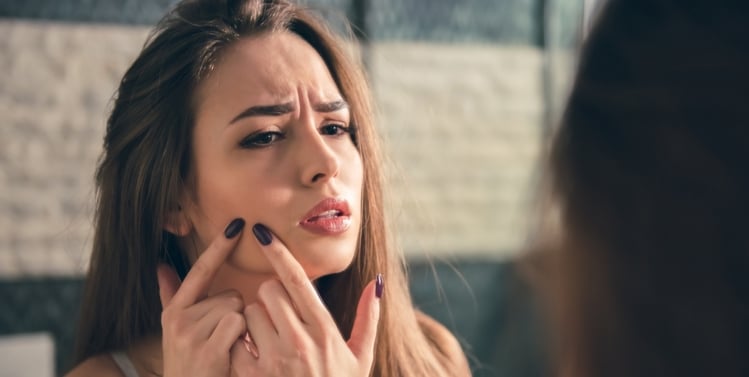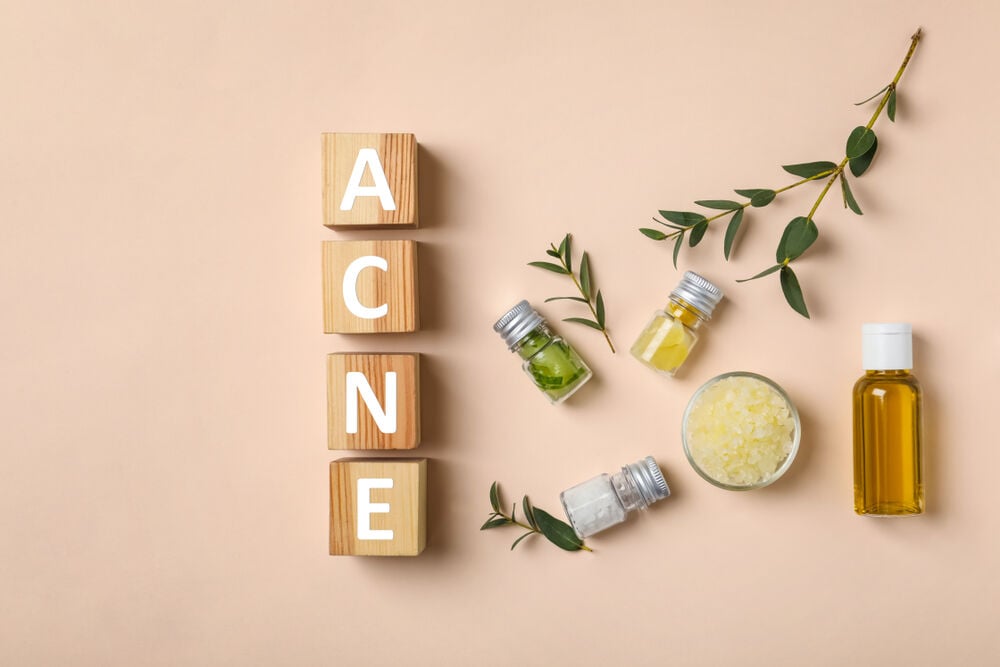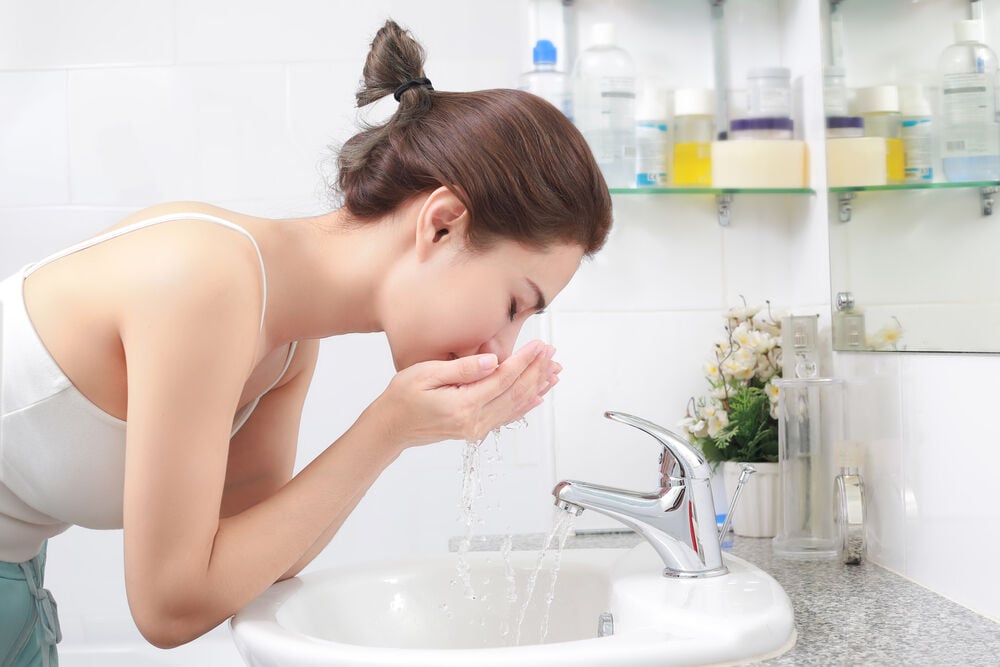In addition to bloating, moodiness, and cramps, acne before your period is another common symptom of premenstrual syndrome. Premenstrual acne is a flare-up of acne every cycle that coincides with your period. According to research, more than 60 percent of acne-prone people develop acne before their period. The flare-ups usually occur 7 to 10 days before menstruation begins and get better as soon as it starts.
-
Tracking cycle
-
Getting pregnant
-
Pregnancy
-
Help Center
-
Flo for Partners
-
Anonymous Mode
-
Flo app reviews
-
Flo Premium New
-
Secret Chats New
-
Symptom Checker New
-
Your cycle
-
Health 360°
-
Getting pregnant
-
Pregnancy
-
Being a mom
-
LGBTQ+
-
Quizzes
-
Ovulation calculator
-
hCG calculator
-
Pregnancy test calculator
-
Menstrual cycle calculator
-
Period calculator
-
Implantation calculator
-
Pregnancy weeks to months calculator
-
Pregnancy due date calculator
-
IVF and FET due date calculator
-
Due date calculator by ultrasound
-
Medical Affairs
-
Science & Research
-
Pass It On Project New
-
Privacy Portal
-
Press Center
-
Flo Accuracy
-
Careers
-
Contact Us
Acne Before Your Period: Causes, Types, and Treatment for Premenstrual Acne


Every piece of content at Flo Health adheres to the highest editorial standards for language, style, and medical accuracy. To learn what we do to deliver the best health and lifestyle insights to you, check out our content review principles.
Causes of acne before your period
The average menstrual cycle lasts about 28 days, and hormones fluctuate continuously throughout the cycle. During the first half of the menstrual cycle, the levels of estrogen rise. During the second half of the cycle, the levels of progesterone rise. As your period approaches, the levels of both of these hormones fall. Meanwhile, your levels of testosterone stay about the same. This means that before and during your period, your testosterone activity is relatively higher than that of estrogen and progesterone.
These hormonal shifts can cause all sorts of skin changes. The rise in progesterone during the middle of the luteal phase stimulates the sebaceous glands to secrete sebum. Sebum is an oily, thick substance that naturally lubricates the skin. The hormonal interactions in the luteal phase may also cause skin to swell, compressing the pores. This can cause sebum to build up under the surface of the skin.
Additionally, having higher testosterone levels before and during your period can stimulate the sebaceous glands even more, causing them to secrete more sebum. The effects of this increased sebum are different for different people. For some people, it can produce a healthy glow. For others, it can cause premenstrual acne as the pores become clogged along with dirt, debris, and dead skin cells.
Increased sebum creates a perfect breeding ground for a bacteria that causes acne, called Cutibacterium acnes. Your immune system reacts to these bacteria, causing inflammation and pimples before your period.

Symptoms of premenstrual acne
Premenstrual acne might include two different kinds of pimples: blackheads and whiteheads.
Blackheads are also called open comedones (comedones are clogged pores) because they are open at the skin’s surface. They look black because of their exposure to oxygen.
Whiteheads are also called closed comedones because they are closed under the surface of the skin.
Apart from blackheads and whiteheads, other types of bumps from acne before your period may include:
- Papules — Small raised red bumps that occur due to infection and inflammation of hair follicles
- Pustules — Small red pimples with a white or yellowish pus-filled center
- Nodules — Solid, painful lumps underneath the skin
- Cysts — Large lumps that are underneath the skin, generally painful, and contain pus
The area around your chin and jawline is more prone to getting premenstrual acne.
Take a quiz
Find out what you can do with our Health Assistant
Is premenstrual acne a form of hormonal acne?
Yes, premenstrual acne is a form of hormonal acne. It occurs because of fluctuations in your hormone levels during your menstrual cycle.
How to prevent acne before your period
There are some lifestyle changes you can try that may help you manage your acne before your period.
Good skin hygiene — Bacteria on your face can aggravate premenstrual acne. Keeping your skin clean can help prevent acne before your period. Avoid touching your face too often because your hands can leave bacteria and dirt on your skin. Your phone can carry a lot of bacteria, so cleaning it frequently may also help prevent premenstrual acne.
When you work out at a gym, be mindful of common surfaces that other people may have touched. You can use towels to cover mats, seats, and handles.

Don’t smoke — Smoking contributes to all kinds of acne.
Maintain a healthy weight — A hormone called sex-hormone binding globulin (SHBG) helps fight off acne. This protein acts like a sponge to soak up testosterone in your bloodstream. Having a healthy amount of SHBG means there’s less testosterone available to cause acne before your period.
Obesity can reduce SHBG sensitivity, thereby increasing testosterone. Eating a well-balanced diet and maintaining a healthy weight may help control acne before your period. Try eating a diet with a low glycemic index with plenty of foods high in zinc, omega-3 fatty acids, selenium, and vitamins A and E. These can be found in seafood, cheese, nuts, and spinach.
Getting enough vitamins and minerals can help improve your acne. Keep in mind, vitamins and minerals can help maintain healthy skin; they’re not useful as a primary treatment for acne.
These are the most important micronutrients for acne-prone skin:
- Zinc — Zinc has the most evidence showing a beneficial effect on acne. Vegetarians are especially likely to have a zinc deficiency.
- Vitamin D — Vitamin D is synthesized by your skin when exposed to sunlight. You might have a deficiency if you live in a northern region or country.
- Vitamins A and E — A deficiency of these vitamins, which are also antioxidants, may make acne more severe.
- Vitamin C — This vitamin has anti-inflammatory properties, and deficiencies in vitamin C may result in more inflammatory acne lesions.
If your acne persists, a topical treatment may help. There are a lot of over-the-counter medicines that you can try, including:
- Alpha hydroxy acids such as lactic and glycolic acid — These improve skin cell turnover to prevent your pores from becoming blocked.
- Antibiotics — They kill bacteria or prevent their growth.
- Azelaic and salicylic acids — These have antimicrobial and anti-inflammatory effects. Salicylic acid acts as a chemical exfoliator. It gets into your oil glands and dissolves blocked dead skin cells and oil that can cause acne. It also helps prevent pore blockages by reducing the amount of oil production. Be careful with salicylic acid. Overdoing it can irritate your skin.
- Benzoyl peroxide — When applied to your skin, it provokes oxygen production, killing anaerobic bacteria.
- Retinoids — These are vitamin A compounds.
- Zinc and sulfur — These also have both antimicrobial and anti-inflammatory properties.
It’s always a good idea to consult with your health care provider before starting any treatment. In some cases, they may suggest additional treatment.
Medicine for acne may be topical (applied on the skin) or systemic (taken orally).
For severe premenstrual acne, you may want to visit a dermatologist. They may prescribe one of the following medicines to relieve your symptoms of acne before your period:
- Spironolactone — This is a diuretic used to treat kidney and cardiovascular diseases. In some cases, health care providers also prescribe it for acne treatment. If you’re already taking birth control pills but it isn’t relieving your acne, your health care provider may add spironolactone. Spironolactone reduces your levels of testosterone and the production of oil in the skin. The side effects of taking spironolactone may include irregular periods, breast tenderness, fatigue, and headaches. Spironolactone may not be right for everyone. It’s important to discuss its benefits and risks with your health care provider.
- Low-dose antibiotics — If you’re experiencing deep-seated acne lesions, your health care provider may prescribe low-dose tetracycline for five days, which you can start a few days before the beginning of your period. Taking low-dose antibiotics can have side effects such as digestive problems, candidiasis, and allergic reaction. Medical experts don’t recommend long-term antibiotic therapy. It can lead to the development of antibiotic resistance in bacteria. Antibiotics can only be prescribed by a health care provider on a case-by-case basis. Only take antibiotics that have been prescribed by your health care provider.
- Isotretinoin — If other treatments haven’t worked for you or you’re experiencing severe cystic acne, then your health care provider may suggest isotretinoin. It’s a vitamin A derivative. The drug can cause side effects including birth defects and an increased risk for mental health problems. Make sure to discuss all the risks and side effects with your health care provider before taking isotretinoin.
If your acne is severe and other treatment methods aren’t working, your health care provider might prescribe birth control pills to manage acne before your period. If you are breaking out before your period on a regular basis, treatment may help. Anything that increases your estrogen levels may lessen the effects of testosterone. This means that there’s less testosterone available to cause acne before your period.
Be patient if you’re using birth control pills to manage premenstrual acne. For some people, acne gets worse before it gets better when they start taking birth control. For the initial three to four months, the body is still adjusting to the hormonal changes caused by birth control. As your body adjusts to the pill, your acne may get better.
Choosing the right birth control and dosage is crucial. This can only be done by a health care provider. They may make the decision based on blood test results, your age, menstrual cycle regularity, and other factors. Using oral contraceptives without a prescription can be dangerous, and the wrong type of birth control pills can make acne worse.
Your dermatologist may be able to help ease acne before your period with in-office treatments including cortisone injections, a chemical peel, laser therapy, and acne surgery.
You can also try some of these at-home tips and treatments to prevent acne before your period:
- Avoid touching your face to keep it clear of bacteria that can cause flare-ups.
- Wash your face twice a day with an oil-free cleanser.
- Make sure to remove your makeup and clean your skin before going to bed.
- Use your fingertips to apply a gentle cleanser. Avoid using a mesh sponge or washcloth because they can irritate your skin and make inflammation worse.
- Use gentle, alcohol-free products. Avoid products that can irritate your skin, such as toners and exfoliants.
- Avoid makeup containing oil.
- Take a shower after exercising or heavy sweating.
- Avoid wearing tight-fitting clothing.
- Eat a well-balanced diet with a minimal amount of refined sugars and fats.
Wrapping up
It’s very common to have acne before your period. One possible cause is the hormonal fluctuations that happen during the menstrual cycle. Increased progesterone during the middle of your cycle may stimulate the secretion of sebum, and increased testosterone before your period can make it worse. These hormonal fluctuations can lead to premenstrual acne as your pores become clogged with excess oil, dirt, and dead skin cells. Bacteria can get into the clogged pores and cause an infection. Premenstrual acne can cause whiteheads, blackheads, papules, pustules, nodules, and cysts.
Your health care provider may suggest birth control pills or medicine called spironolactone to help prevent acne before your period.
Obesity can disrupt the natural balance of your hormones and lead to acne before your period. Maintaining a healthy weight can help keep your skin clear.
Practicing good skin hygiene can also help prevent premenstrual acne.
Your health care provider may prescribe isotretinoin or low-dose antibiotics for severe acne.


Hey, I'm Anique
I started using Flo app to track my period and ovulation because we wanted to have a baby.


The Flo app helped me learn about my body and spot ovulation signs during our conception journey.


I vividly
remember the day
that we switched
Flo into
Pregnancy Mode — it was
such a special
moment.
Real stories, real results
Learn how the Flo app became an amazing cheerleader for us on our conception journey.
References
“SHBG Blood Test: MedlinePlus Medical Test.” MedlinePlus, U.S. National Library of Medicine, 26 Feb. 2020, medlineplus.gov/lab-tests/shbg-blood-test/.
“Premenstrual Syndrome (PMS).” Mayo Clinic, Mayo Foundation for Medical Education and Research, 7 Feb. 2020, www.mayoclinic.org/diseases-conditions/premenstrual-syndrome/symptoms-causes/syc-20376780.
“Acne.” Mayo Clinic, Mayo Foundation for Medical Education and Research, 18 Feb. 2020, www.mayoclinic.org/diseases-conditions/acne/symptoms-causes/syc-20368047.
“Acne: Tips for Managing.” American Academy of Dermatology, www.aad.org/public/diseases/acne/skin-care/tips.
“Acne.” NHS Choices, NHS, 12 July 2019, www.nhs.uk/conditions/acne/.
“Can the Right Diet Get Rid of Acne?” American Academy of Dermatology, www.aad.org/public/diseases/acne/causes/diet.
Birkebaek, N H, et al. “Effect of Weight Reduction on Insulin Sensitivity, Sex Hormone-Binding Globulin, Sex Hormones and Gonadotrophins in Obese Children.” European Journal of Endocrinology, U.S. National Library of Medicine, Dec. 2010, pubmed.ncbi.nlm.nih.gov/20829367/.




